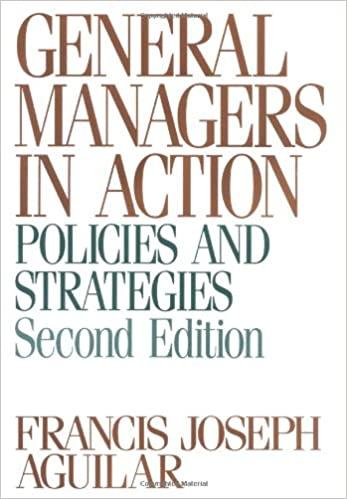Question
PLEASE HELP NEED IN ONE HOUR QUESTION 6 The logistics function involves a. managing the production schedules for manufacturers b. forecasting inventory levels c. purchasing
PLEASE HELP NEED IN ONE HOUR
QUESTION 6
The logistics function involves
| a. | managing the production schedules for manufacturers | |
| b. | forecasting inventory levels | |
| c. | purchasing materials to manufacture products | |
| d. | storing, warehousing and transporting products |
5 points
QUESTION 7
Supply chains for commodity type products need to prioritize
| a. | speed and security | |
| b. | speed and wide variety | |
| c. | low price and high availability | |
| d. | high availability and speed |
5 points
QUESTION 8
In looking at tiers in a supply chain, the companies that you buy your supplies from would be considered your
| a. | tier 1 suppliers | |
| b. | tier 2 suppliers | |
| c. | customers | |
| d. | retailers |
5 points
QUESTION 9
A major advantage of businesses offshoring their operations is it
| a. | leads to higher transportation costs | |
| b. | helps improve communications between suppliers | |
| c. | reduces labor costs | |
| d. | contributes to increase in government regulations |
5 points
QUESTION 10
A company's 2nd tier suppliers primarily refers to
| a. | their stakeholders | |
| b. | their customer base | |
| c. | their suppliers' suppliers | |
| d. | their service providers |
5 points
QUESTION 11
Outsourcing can best be described as the
| a. | the use of overseas companies to make your products | |
| b. | using your own employees to make products you sell | |
| c. | importing products from other countries | |
| d. | using external companies to make your products |
5 points
QUESTION 12
A purchasing decision that your company may face that can create an ethical dilemma is
| a. | accepting gifts from suppliers | |
| b. | encouraging fair competition | |
| c. | avoiding slave labor | |
| d. | dealing honestly with suppliers |
When choosing suppliers, companies have to consider the 'cost of supplier risk'. An example of a supplier risk is
| a. | the risk that your company will go bankrupt | |
| b. | the risk that a supplier might make unauthorized copies of your products and sell them to others | |
| c. | the risk that consumers will buy products from your competitors | |
| d. | the risk that your inventory won't sell fast enough |
One strategy a company can decide to handle supplier risks they are faced with is to 'accept' the risk. In accepting the risk,
| a. | you determine what things can be done to mitigate the risk | |
| b. | you find ways to avoid the risk | |
| c. | you decide to transfer the risk to someone else if it's unavoidable | |
| d. | you are willing and prepared to live with the consequences if it occurs |
Many products continue to costs money after your company has purchased them (and even after you have used or sold them). An example of this additional costs is/are
| a. | product warranties and recalls | |
| b. | transportation costs | |
| c. | insurance costs | |
| d. | sales costs |
Every product and service has a supply chain.
True
False
In a supply chain, materials flow downstream and money flows upstream.
True
False
Responsiveness in a supply chain can be measured from the time a customer places an order to the time it takes for the order to be delivered.
True
False
Supply chains are interconnected - so making a change in one area to lower costs will Not cause costs in another area to increase.
True
False
Inventory optimization involves increasing inventories to the minimum level necessary to maintain the desired service level (to satisfy your customers).
True
False
Step by Step Solution
There are 3 Steps involved in it
Step: 1

Get Instant Access to Expert-Tailored Solutions
See step-by-step solutions with expert insights and AI powered tools for academic success
Step: 2

Step: 3

Ace Your Homework with AI
Get the answers you need in no time with our AI-driven, step-by-step assistance
Get Started


